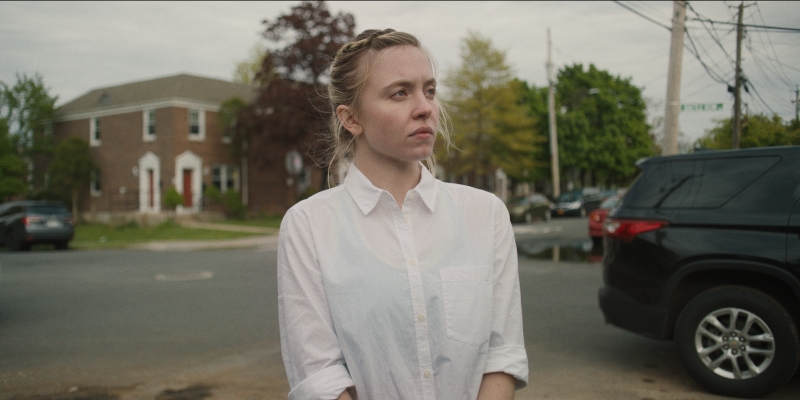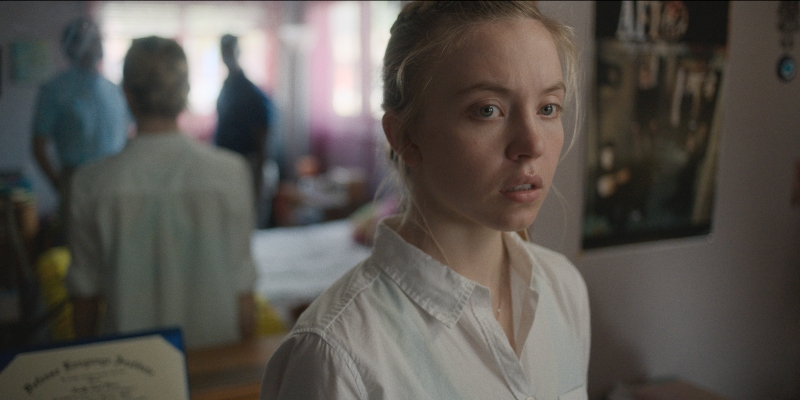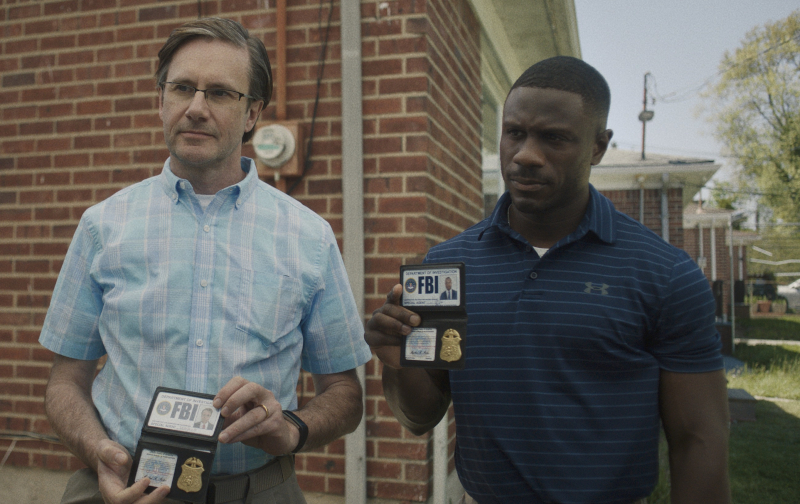Director – Tina Satter – 2023 – US – Cert. 12a – 83m
*****
A young woman working in US security services is questioned in her home by two FBI interrogators who believe she’s leaked classified documents to The Intercept – out in UK and Irish cinemas on Friday, June 2nd
This film is based on a true story. That commonly used phrase can encompass everything from attempts at verisimilitude through to extreme misrepresentation. This film, however, is something different from most films bearing that legend.
The true story on which this film is based is an interview of a woman by two FBI agents. That organisation’s protocols dictate that such incidents, planned ahead of their execution, must be recorded in transcription form. So the film is not based on the incident so much as it is based on the official transcript of it. That includes not only the verbal words, but also pauses or gaps on the parts of those speaking them.

Writer-director Satter was hooked by the transcript and has already turned it into the critically acclaimed Broadway play Is This A Room. Theatre and cinema, while they often share certain elements, are essentially two different media; a successful play has an immediate attraction to movie producers who believe its proven theatrical track record will sell cinema tickets, yet the cinema is littered with stagebound adaptation of plays which worked far better on stage than screen.
As far as I can tell, Satter has not tried to adapt her play as such, but instead returned to the original transcript as the source material for a film, which would appear to be a wise move. Her exploration of the text on a stage has no doubt taught her a great deal, but she has not allowed that experience to get in the way of this movie being not a stage play but a movie.

The transcribed incident occurred in Augusta, Georgia, US, on June 3rd, 2017 when Reality Winner, 25, returned home to find two FBI Special Agents Garrick and Taylor waiting to question her. In Satter’s film, those three real life people are played by Sydney Sweeney, Josh Hamilton and Marchánt Davis respectively.
In Winner’s day job at the time, at least as portrayed in the film, she worked in a security facility on a computer workstation confined within her individual cubicle translating documents from Farsi to English. The room in which she and others are similarly isolated is fitted with wall-mounted TVs which constantly play Fox News. It’s not an environment conducive to carrying out the assigned work, or to make the workers feel pride in their work. It’s dehumanising. This raises serious questions about the nature of work, something to explore on another occasion because it’s not really the main subject of what this film is about: it’s preamble to the textual adaptation.

The conversation begins with Reailty parking her car at her home and discovering two men (shortly to introduce themselves as Agents Garrick and Taylor) knocking on the car window before moving on with small talk about whether she has pets or weapons in the house via explanations of what is going to happen in the ensuing conversation through to the questioning itself. Most of this is done by Garrick, with Taylor largely standing around for support and the odd conversational remark, and always in the politest, friendliest manner which somehow renders everything that occurs all the more terrifying.
At one point, she mentions the wall-to-wall Fox News at work and suggests that this factor may have pushed her over the edge. What kind of insane person, team or state dreams up a working environment like this?, one wonders. It’s like 21st Century Kafka.

Actually, the whole film is like 21st Century Kafka. The security breach this woman has committed turns out to involve a document detailing about Russian interference in the 2016 US Presidential election, and if you stop and think about that, you might think that might be information which should not be classified, but rather released into the public domain for the purposes of discussion of a potentially inflammatory issue. The film will certainly make you question the role of the State and whether security services should possess all the powers they do.
The filmmaking strategy reminded me a little of The Arbor (Clio Barnard, 2019), which recorded real interview material and then had actors mime to the audio. That’s not quite what Satter has done here, but taking an FBI transcript and having actors speak and perform that verbal text is loosely in the same area. Satter has nevertheless come up with a provocative and challenging piece, not something to go and see without knowing what you’re in for – however, if you’re forewarned, it’s well worth a look and still likely to generate heated discussion after viewing. One of the must-see movies of the year.
Reality is out in cinemas in the UK and Ireland on Friday, June 2nd.
Read my alternate review at Reform magazine.
Trailer:
